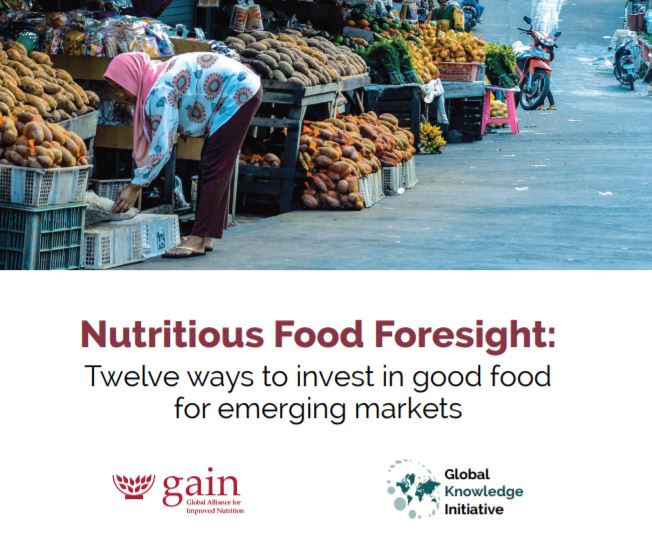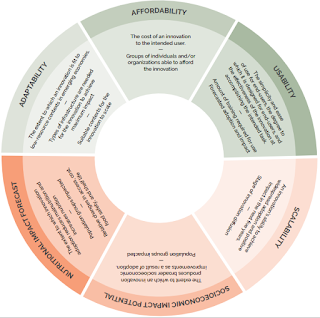29 May 2019. Launch of Nutrition Connect: nutritionconnect.org.
Nutrition Connect, an initiative from GAIN, is focused on harnessing public private engagement to drive investment, action and impact to make nutritious and safe foods the norm.
Nutrition Connect is an open access resource which aims to bring together the knowledge we already have around public private engagement, stimulate the development of new knowledge, and generate dialogue and partnerships.
Videos:
In this video, Lawrence Haddad, Executive Director, Global Alliance for Improved Nutrition, tells more about Nutrition Connect.
Mr Ciarán Cannon, T.D., Minister of State for the Diaspora and International Development speaks to why Nutrition Connect is an important part of Ireland’s international development strategy.
Resources: Nutritious Food Foresight: Twelve ways to invest in good food in emerging markets
Nutritious Food Foresight: Twelve ways to invest in good food in emerging markets
Hansen, A.R., Keenan, C., and Sidhu, G.
Global Knowledge Initiative and Global Alliance for Improved Nutrition (GAIN) May 2019, 55 pages
This report sheds light on twelve specific innovations which we judge can reduce the price of nutritious food, address food safety issues, and increase shelf life, in low and middle-income country settings. In all cases, the primary beneficiaries of the deployment of these innovations would be the poor (or at a minimum, those on modest incomes). All twelve innovations are ready to be deployed at scale within the next five years. The report provides numerous concrete examples of how each concept has already been implemented in a relevant setting. 
Equally importantly, given the accelerated rate of innovation development, the report is intended to provide a methodology for screening and prioritising innovations. This methodology is available for others to use, perhaps looking at other important characteristics such as potential for gender transformation or mitigation of the effects of climate change.
The panel prioritized their top 12 innovations within the four “Delphi Directives,” which include:
“Everything was about calories and making sure there was enough. Now, it is making sure that people have access to nutritious food. It’s about pointing out the importance to invest in the infrastructure and the supply chains in developing countries because we will benefit from that as well.”
“By adopting new strategies in renewable energy and transportation, there can be practical options to improve access to nutritious food that may provide better returns on investments. I believe this will only happen if each of the innovations has a business model. We see
more and more entrepreneurs who are mission driven and want to do good, instead of a non-profit project that ends after it has been implemented.” Dr. Simone Frey, founder of Nutrition-Hub and Future of Nutrition,
 To unlock change, the authors of this report call for collaboration:
To unlock change, the authors of this report call for collaboration: The Global Alliance for Improved Nutrition (GAIN) offers a new, first-of-its-kind executive short course, Together for nutrition, which focuses on public-private engagements to improve the consumption of nutritious food. The course will bring together 30 participants with an equal number coming from the public and private sectors.
Source: PAEPARD FEED
by secretary
by secretary
by secretary
by secretary
by secretary
by secretary
by secretary
by secretary
by secretary
by secretary
by secretary
by secretary
by secretary
by secretary
by secretary
by secretary
by secretary
by secretary
by secretary
by secretary
by secretary
by secretary
by secretary
by secretary
by secretary
by secretary
by secretary
by secretary
by secretary
by secretary
by secretary
by secretary
by secretary
by secretary
by secretary
by secretary
by secretary
by secretary
by secretary
by secretary
by secretary
by secretary
by secretary
by secretary
by secretary
by secretary
by secretary
by secretary
by secretary
by secretary
by secretary
by secretary
by secretary
by secretary
by secretary
by secretary
by secretary
by secretary
by secretary
by secretary
by secretary
by secretary
by secretary
by secretary
by secretary
by secretary
by secretary
by secretary
by secretary
by secretary
by secretary
by secretary
by secretary
by secretary
by secretary
by secretary
by secretary
by secretary
by secretary
by secretary
by secretary
by secretary
by secretary
by secretary
by secretary
by secretary
by secretary
by secretary
by secretary
by secretary
by secretary
by secretary
by secretary
by secretary
by secretary
by secretary
by secretary
by secretary
by secretary
by secretary
by secretary
by secretary
by secretary
by secretary
by secretary
by secretary
by secretary
by secretary
by secretary
by secretary
by secretary
by secretary
by secretary
by secretary
by secretary
by secretary
by secretary
by secretary
by secretary
by secretary
by secretary
by secretary
by secretary
by secretary
by secretary
by secretary
by secretary
by secretary
by secretary
by secretary
by secretary
by secretary
by secretary
by secretary
by secretary
by secretary
by secretary
by secretary
by secretary
by secretary
by secretary
by secretary
by secretary
by secretary
by secretary
by secretary
by secretary
by secretary
by secretary
by secretary
by secretary
by secretary
by secretary
by secretary
by secretary
by secretary
by secretary
by secretary
by secretary
by secretary
by secretary
by secretary
by secretary
by secretary
by secretary
by secretary
by secretary
by secretary
by secretary
by secretary
by secretary
by secretary
by secretary
by secretary
by secretary
by secretary
by secretary
by secretary
by secretary
by secretary
by secretary
by secretary
by secretary
by secretary
by secretary
by secretary
by secretary
by secretary
by secretary
by secretary
by secretary
by secretary
by secretary
by secretary
by secretary
by secretary
by secretary
by secretary
by secretary
by secretary
by secretary
by secretary
by secretary
by secretary
by secretary
by secretary
by secretary
by secretary
by secretary
by secretary
by secretary
by secretary
by secretary
by secretary
by secretary
by secretary
by secretary
by secretary
by secretary
by secretary
by secretary
by secretary
by secretary
by secretary
by secretary
by secretary
by secretary
by secretary
by secretary
by secretary
by secretary
by secretary
by secretary
by secretary
by secretary
by secretary
by secretary
by secretary
by secretary
by secretary
by secretary
by secretary
by secretary
by secretary
by secretary
by secretary
by secretary
by secretary
by secretary
by secretary
by secretary
by secretary
by secretary
by secretary
by secretary
by secretary
by secretary
by secretary
by secretary
by secretary
by secretary
by secretary
by secretary
by secretary
by secretary
by secretary
by secretary
by secretary
by secretary
by secretary
by secretary
by secretary
by secretary
by secretary
by secretary
by secretary
by secretary
by secretary
by secretary
by secretary
by secretary
by secretary
by secretary
by secretary
by secretary
by secretary
by secretary
by secretary
by secretary
by secretary
by secretary
by secretary
by secretary
by secretary
by secretary
by secretary
by secretary
by secretary
by secretary
by secretary
by secretary
by secretary
by secretary
by secretary
by secretary
by secretary
by secretary
by secretary
by secretary
by secretary
by secretary
by secretary
by secretary
by secretary
by secretary
by secretary
by secretary
by secretary
by secretary
by secretary
by secretary
by secretary
by secretary
by secretary
by secretary
by secretary
by secretary
by secretary
by secretary
by secretary
by secretary
by secretary
by secretary
by secretary
by secretary
by secretary
by secretary
by secretary
by secretary
by secretary
by secretary
by secretary
by secretary
by secretary
by secretary
by secretary
by secretary
by secretary
by secretary
by secretary
by secretary
by secretary
by secretary
by secretary
by secretary
by secretary
by secretary
by secretary
by secretary
by secretary
by secretary
by secretary
by secretary
by secretary
by secretary
by secretary
by secretary
by secretary
by secretary
by secretary
by secretary
by secretary
by secretary
by secretary
by secretary
by secretary
by secretary
by secretary
by secretary
by secretary
by secretary
by secretary
by secretary
by secretary
by secretary
by secretary
by secretary
by secretary
by secretary
by secretary
by secretary
by secretary
by secretary
by secretary
by secretary
by secretary
by secretary
by secretary
by secretary
by secretary
by secretary
by secretary
by secretary
by secretary
by secretary
by secretary
by secretary
by secretary
by secretary
by secretary
by secretary
by secretary
by secretary
by secretary
by secretary
by secretary
by secretary
by secretary
by secretary
by secretary
by secretary
by secretary
by secretary
by secretary
by secretary
by secretary
by secretary
by secretary
by secretary
by secretary
by secretary
by secretary
by secretary
by secretary
by secretary
by secretary
by secretary
by secretary
by secretary
by secretary
by secretary
by secretary
by secretary
by secretary
by secretary
by secretary
by secretary
by secretary
by secretary
by secretary
by secretary
by secretary
by secretary
by secretary
by secretary
by secretary
by secretary
by secretary
by secretary
by secretary
by secretary
by secretary
by secretary
by secretary
by secretary
by secretary
by secretary
by secretary
by secretary
by secretary
by secretary
by secretary
by secretary
by secretary
by secretary
by secretary
by secretary
by secretary
by secretary
by secretary
by secretary
by secretary
by secretary
by secretary
by secretary
by secretary
by secretary
by secretary
by secretary
by secretary
by secretary
by secretary
by secretary
by secretary
by secretary
by secretary
by secretary
by secretary
by secretary
by secretary
by secretary
by secretary
by secretary
by secretary
by secretary
by secretary
by secretary
by secretary
by secretary
by secretary
by secretary
by secretary
by secretary
by secretary
by secretary
by secretary
by secretary
by secretary
by secretary
by secretary
by secretary
by secretary
by secretary
by secretary
by secretary
by secretary
by secretary
by secretary
by secretary
by secretary
by secretary
by secretary
by secretary
by secretary
by secretary
by secretary
by secretary
by secretary
by secretary
by secretary
by secretary
by secretary
by secretary
by secretary
by secretary
by secretary
by secretary
by secretary
by secretary
by secretary
by secretary
by secretary
by secretary
by secretary
by secretary
by secretary
by secretary
by secretary
by secretary
by secretary
by secretary
by secretary
by secretary
by secretary
by secretary
by secretary
by secretary
by secretary
by secretary
by secretary
by secretary
by secretary
by secretary
by secretary
by secretary
by secretary
by secretary
by secretary
by secretary
by secretary
by secretary
by secretary
by secretary
by secretary
by secretary
by secretary
by secretary
by secretary
by secretary
by secretary
by secretary
by secretary
by secretary
by secretary
by secretary
by secretary
by secretary
by secretary
by secretary
by secretary
by secretary
by secretary
by secretary
by secretary
by secretary
by secretary
by secretary
by secretary
by secretary
by secretary
by secretary
by secretary
by secretary
by secretary
by secretary
by secretary
by secretary
by secretary
by secretary
by secretary
by secretary
by secretary
by secretary
by secretary
by secretary
by secretary
by secretary
by secretary
by secretary
by secretary
by secretary
by secretary
by secretary
by secretary
by secretary
by secretary
by secretary
by secretary
by secretary
by secretary
by secretary
by secretary
by secretary
by secretary
by secretary
by secretary
by secretary
by secretary
by secretary
by secretary
by secretary
by secretary
by secretary
by secretary
by secretary
by secretary
by secretary
by secretary
by secretary
by secretary
by secretary
by secretary
by secretary
by secretary
by secretary
by secretary
by secretary
by secretary
by secretary
by secretary
by secretary
by secretary
by secretary
by secretary
by secretary
by secretary
by secretary
by secretary
by secretary
by secretary
by admin
by admin
by admin
by admin
by admin
by admin
by admin
by admin
by admin

